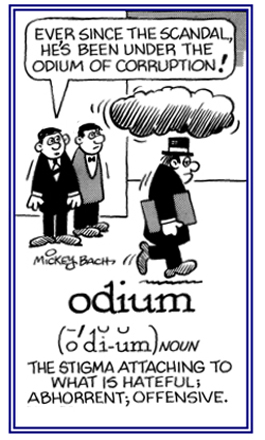odi-, noi-, noy-
(Latin: to hate, hatred, hateful; despise)
2. To trouble; to vex: "I was annoyed by the disturbance of my afternoon nap."
"Please, do not annoy me with your interruptions while I am trying to explain this recipe."
3. Etymology: from Anglo-French anuier, from Old French enuier, "to weary, to vex"; from Late Latin inodiare, "to make loathsome"; from Latin, (esse) in odio, "(it is to me) hateful"; ablative, or a grammatical form, of odium, "hatred".2. The act of troubling or annoying someone.
3. Something or someone that causes trouble; a source of unhappiness.
4. Anger produced by some irritation.
5. An unpleasant person who is annoying or exasperating.
6. The psychological state of being irritated or annoyed.
2. A reference to anyone who disturbs or irritates; especially, by repeated acts of harassment or quick brief attacks.
3. A person who wears on the nerves of others with persistent-petty unpleasantness.
2. Descriptive of being irritating or causing vexation.
2. Listlessness and dissatisfaction resulting from lack of interest; boredom.
3. Etymology: from French, from Old French enui, from ennuier, "to annoy, to bore", from Vulgar Latin inodiare, from Latin in odio (esse), (to be) odious; in, "in" + odio, ablative of odium, "hate".
The phrase mihi in odio est, literally translated as "to me in a condition of dislike or hatred is"; meaning, "I hate or dislike", gave rise to the Vulgar Latin verb -inodiare, "to make odious", the source of Modern French ennuyer, "to annoy, to bore".
In the Old French period a noun meaning "worry, boredom", came from the verb ennuier. This noun in its Modern French form ennui was borrowed into English in the sense "boredom", the English word being first recorded in 1732.
People might have needed a word for boredom in the polite, cultivated world of the 18th century, but during an earlier period, about 1275, the English language had already borrowed the French verb ennuier, the source of our word "annoy".
This noun (ennui), with the sense “boredom,” was borrowed into English in the 18th century, perhaps filling a need in polite, cultivated society. One of the earliest instances of annoy in English is, in fact, used in the sense of "to bore an audience."
2. Extremely harmful or dangerous.
3. Etymology: from Middle English, noysome, "harmful, noxious", from noye, "harm, misfortune"; a shortened form of anoi, "annoyance"; from Old French anoier + -some. The meaning of "bad-smelling" was first recorded in 1577.
2. A descriptive term for anything which is harmful or injurious to one's health; noxious.
2. A reference to being offensive to the senses and; especially, to the sense of smell: "I couldn't stand the noisome garbage which has been there for days."
3. Something which is highly obnoxious or objectionable.
Recognition that we are apt to speak imprudently while under the influence.
Horace, Odes iii. 1
2. Arousing or meriting strong dislike, aversion, or intense displeasure.
3. Etymology: from Anglo-French odious, from Old French odieus (1376, Modern French odieux); from Latin odiosus, "hateful" from odium, "hatred".
2. Hatefully; in a manner to deserve or excite hatred.
3. Invidiously (unpleasant because something produces or is likely to produce jealousy, resentment, or hatred in other people); so as to cause hate.
2. Hatefulness; the quality that deserves or may excite hatred; such as, the odiousness of sin.


